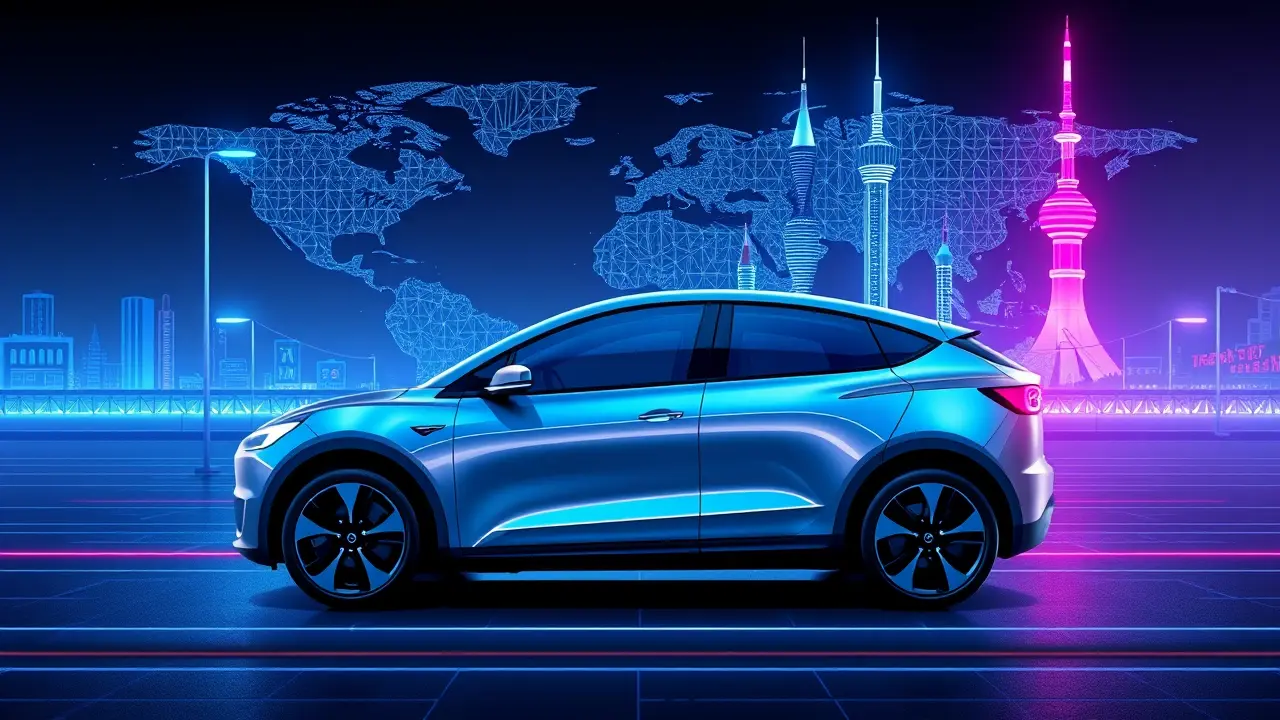China's EV makers expand overseas as Tesla boosts Shanghai output.
The global electric vehicle landscape is undergoing a seismic shift, reminiscent of the early space race, with China's automotive giants aggressively expanding their cosmic footprint beyond terrestrial borders while Tesla's Shanghai Gigafactory achieves orbital delivery velocities. This isn't merely an industrial story; it's a grand experiment in technological sovereignty and market dominance, playing out with the kinetic energy of a rocket launch.Tesla's Shanghai facility, a beacon of Elon Musk's interplanetary vision applied to terrestrial transport, has shattered delivery records, primarily propelled by a refined Model Y variant that has captivated China's affluent consumers who prioritize vehicular spaciousness—a preference as deeply ingrained as the desire for a spacious spacecraft on a long-duration mission. This surge occurs against a backdrop of calculated European anxiety, where the European Union views the incoming wave of sophisticated, cost-competitive Chinese EVs not as mere imports, but as an economic shockwave threatening to destabilize its own automotive industrial base, a sector long accustomed to dictating terms of engagement.The strategic calculus for Chinese manufacturers like BYD, Nio, and XPeng involves a multi-pronged assault: establishing manufacturing outposts in strategic locales such as Southeast Asia and Europe to circumvent potential tariff walls, while simultaneously building brand equity through advanced driver-assistance systems and battery technology that rivals, and in some metrics surpasses, established Western counterparts. One must consider the historical precedent; this is not unlike the Japanese auto invasion of the 1970s and 80s, but accelerated by a factor of ten, powered by lithium-ion cells instead of internal combustion, and backed by a state-level industrial policy that views EV supremacy as a national imperative.The geopolitical ramifications are profound, potentially redrawing the map of global supply chains for critical minerals like lithium and cobalt, and forcing a recalibration of trade alliances. Expert commentary from analysts at firms like Bernstein points to a looming price war on a global scale, a conflict where Chinese producers, benefiting from substantial domestic economies of scale and vertical integration, can operate on margins that would be unsustainable for legacy automakers.The consequence is a forced evolution: traditional titans like Volkswagen and General Motors must now innovate at a breakneck pace or face being relegated to niche players, while Tesla finds itself in the paradoxical position of being both a pioneer and a target, its Shanghai success simultaneously validating the Chinese market for EVs while sharpening the competitive claws of its local rivals. The broader context extends to energy security and climate goals; this EV proliferation is intrinsically linked to national strategies for reducing fossil fuel dependence, making every vehicle sold a data point in a larger struggle for influence. As these electric fleets grow, so too does the infrastructure battle—charging networks, battery swapping stations, and smart grid integration become the new high ground in a war where the prize is nothing less than the future of mobility itself, a future being forged today in the factories of Shanghai and on the drawing boards of Shenzhen.
Latest News
The charts are whispering what the true believers have felt in their bones for weeks—Dogecoin is carving out a bottom.
17 hours ago5 comments
The Institute for Fiscal Studies has thrown a stark warning onto Rachel Reeves's desk, urging the Chancellor to confront a potential £22 billion shortfall in
17 hours ago3 comments
Alright, let's break down this absolute heater of a performance from the Chicago Blackhawks, because if you missed this one, you missed a party.
17 hours ago5 comments
The ice was hot last night in the NHL, folks, serving up a slate of games that felt less like a regular season Tuesday and more like a playoff preview with a
18 hours ago3 comments
The XRP chart is painting a tantalizing picture for those with the stomach to withstand the relentless pressure from crypto's leviathans.
18 hours ago4 comments
It’s in the small shifts, the quiet recalibrations of a Thursday morning, where the most meaningful change often takes root.
18 hours ago4 comments
In a move that sent ripples of quiet confidence through the crypto ecosystem, blockchain intelligence firms tracked a monumental treasury allocation from
18 hours ago4 comments
In a move that would have drawn a nod of approval from historical figures like Churchill, who understood the delicate balance of power within democratic
18 hours ago2 comments
JA
Jamie Larson123k1 day ago
but what if all this 'EV supremacy' talk is just creating another tech bubble? feels like we're just swapping one set of problems for another tbh
0
MA
Maya Chen123k1 day ago
tbh the space race comparison feels a bit much but idk china's ev growth is kinda insane
0
CH
Chloe Bennett123k1 day ago
the way this is written feels like watching a rocket launch in fast forward, all these bright corporate colors smashing into each other idk it's a lot to take in
0
MA
Maya Petrova123k2 days ago
it's like watching a storm build in slow motion, each new vehicle a data point in a much larger story about power
0
